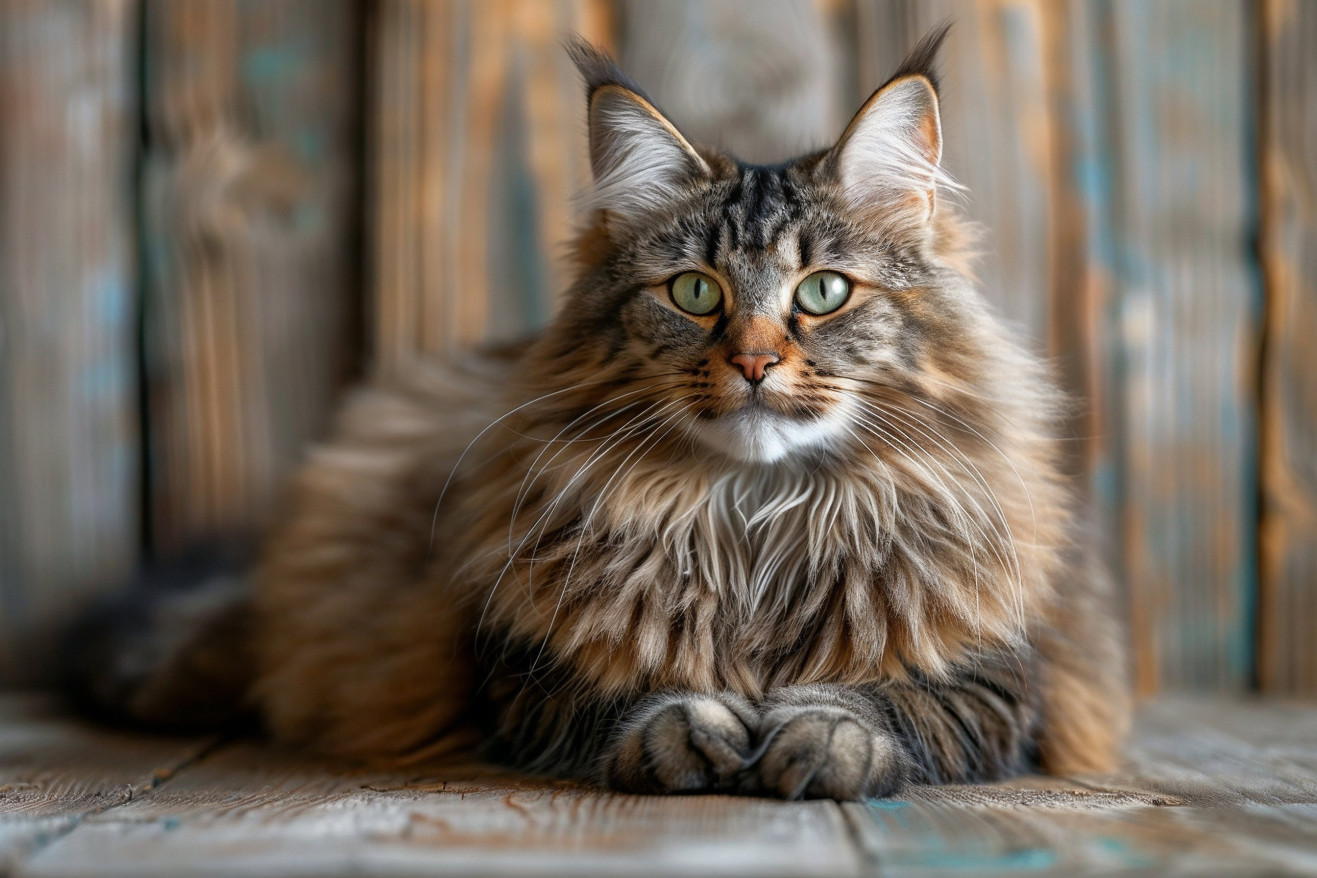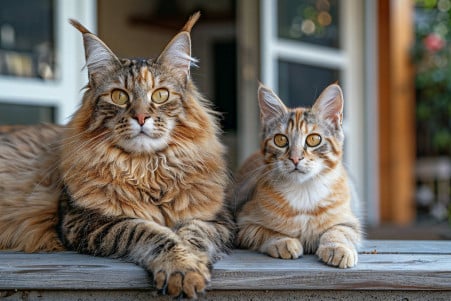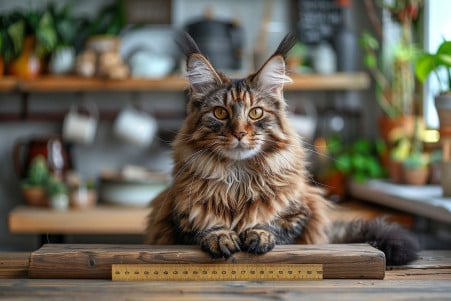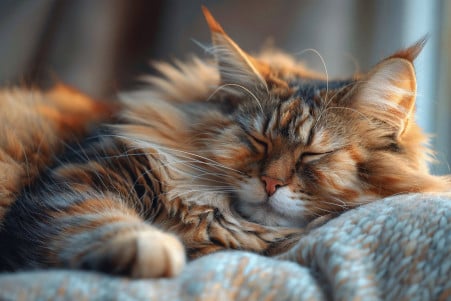Is My Cat a Maine Coon? Physical and Behavioral Signs
21 May 2024 • Updated 20 May 2024

With their large size, tufted paws, and distinctive facial features, the Maine Coon is a cat breed that stands out - but how can you know if your cat is really a member of this special breed? The most obvious sign is their size, with male Maine Coons weighing between 10 and 16 lbs and females weighing between 8 and 12 lbs. Other physical characteristics include a rectangular body shape, tufted ears and paws that resemble a lynx, and a long, shaggy coat. If you got your cat from a breeder, the best way to know for sure is to check their paperwork.
While physical characteristics are the most important, we'll also look at the results of behavioral studies to see if there are any less obvious signs that your cat has Maine Coon in them. From their hunting skills and energy levels, to their meows and how much they like to be around people, there are certain behavioral traits that appear to be linked to the breed. We'll go over the most recent findings to help you figure out if your cat's behavior lines up with the traits that researchers have found in purebred Maine Coons.
Is my cat a Maine Coon?
How to Tell If Your Cat Is a Maine Coon or Mixed Breed
If you have a purebred Maine Coon, you should have documentation from the breeder that proves your cat's pedigree. If you're not sure if your cat is a Maine Coon or a mix, you can also get a DNA test to confirm your cat's breed. However, if you have a Maine Coon mix or a mixed breed, there are still some signs that you can look for to determine if your cat has Maine Coon in their background. According to Maine Coon Cat Nation, some of the most common physical signs that your cat may be a Maine Coon mix include large size, ear tufts, long fur, and a variety of coat colors. However, without a pedigree or genetic testing, it's impossible to know for sure if your cat has Maine Coon in their background, and you can only make an educated guess based on the evidence you see.
Catster lists several physical traits that may indicate that your cat is a purebred Maine Coon or a mix. These include the cat's size at maturity, the thickness and texture of their coat, the shape of their ears, the bushiness of their tail, and even whether or not they have extra toes. However, the only way to know for sure is to get a DNA test, which will tell you exactly what breeds your cat is made up of.
Maine Coons are often mixed with domestic shorthairs or other long-haired cats like Persians or Siberians. While these mixed breeds may have some Maine Coon traits, such as a rectangular body shape or lynx-tipped ears, Hepper says that they will generally be smaller and have less of a mane than a purebred Maine Coon. Lincolnway Veterinary Clinic also suggests that you look at the length of the cat's tail and the tufting on their paws to determine if they are a mix or a purebred.
How to Groom and Care for Maine Coon Cats
Maine Coons' long, thick fur requires regular grooming. Untamed explains that they should be brushed 2-3 times a week with a soft bristle brush to remove loose fur and prevent matting. Sassykoonz suggests daily combing with a glove brush and using a slicker brush every 2-3 days to get rid of tangles.
In addition to regular grooming, monthly baths with a cat-friendly shampoo and conditioner and regular nail clippings are important for maintaining a Maine Coon's hygiene and comfort. The Cat Care Center notes that it's important to start grooming a Maine Coon as a kitten and to use positive reinforcement, such as treats, to ensure that they are comfortable with the process.
Untamed also points out that a diet that is high in protein is essential for maintaining a Maine Coon's coat. A healthy diet can also help reduce the amount of shedding that Maine Coons are known for. With the right care and feeding, Maine Coons can keep their beautiful, thick coats looking their best.
Training and Discipline for Maine Coons
Maine Coons are friendly, smart, and social cats, so they are usually open to training. Untamed suggests using positive reinforcement, including treats and praise, to train Maine Coons and to make sure that training is fun and stimulating. Meanwhile, Catster says that the best time to start training a Maine Coon is between 2 and 4 months old since they are most open to learning new behaviors at this age, although training an adult Maine Coon is also an option.
When training a Maine Coon, it's best to keep training sessions short because of their short attention spans, use their favorite treats as a reward, and be patient and consistent, according to Catster. In addition, Maine Coons can also be trained to walk on a leash, which is a good idea since their size and energy levels mean that they will likely enjoy going for walks and other outdoor adventures. However, Sassykoonz warns that it may take some time and effort to get a Maine Coon used to walking on a leash.
If you use the right training methods and are dedicated to positive reinforcement, Maine Coons can be trained to do everything from basic commands to more complex behaviors. This will help them use their intelligence and curiosity in a positive way, which can help them stay healthy and happy throughout their lives.
Health Issues and Life Expectancy of Maine Coons
While Maine Coons are known for their robust health, they are prone to certain genetic health issues, according to Untamed. The most common Maine Coon health problems are spinal muscular atrophy (SMA), hypertrophic cardiomyopathy (HCM), hip dysplasia, stomatitis, and polycystic kidney disease (PKD).
This is why it's important to take your cat to the vet for regular check-ups, as this will help ensure that any potential health issues are caught early. Litter-Robot explains that with the right care, Maine Coons can live to be between 12 and 15 years old on average, and some may even live into their late teens or early 20s. Diet, exercise, and keeping your cat at a healthy weight are all important factors in helping your cat live a long life.
Catster provides examples of Maine Coons that lived to be very old, including one that lived to be 24 years old despite having health issues. By feeding your cat a high-quality, meat-based diet and making sure they get plenty of mental and physical exercise, you can help your Maine Coon live a long and healthy life well into their senior years.
Conclusion: Is Your Cat a Maine Coon?
The Maine Coon is a unique and popular breed, thanks to its large size, shaggy coat, and friendly, intelligent nature. While certain physical characteristics, such as a rectangular body, large paws, and long, bushy tail, can be helpful in identifying a Maine Coon, the only way to be sure that a cat is a purebred Maine Coon is to have documentation from a breeder or to have the cat genetically tested.
That said, even if your cat isn't a purebred Maine Coon, they may still have some of the breed's traits, including a large size, tufted ears, or a variety of coat colors and patterns. It's important to make sure that all Maine Coons, purebred or mixed, receive the grooming, training, and care they need to stay healthy and happy.
If you think your cat may be part Maine Coon, talk to your vet or a reputable breeder to learn more. With their friendly personalities and loving dispositions, Maine Coons can be wonderful pets.


